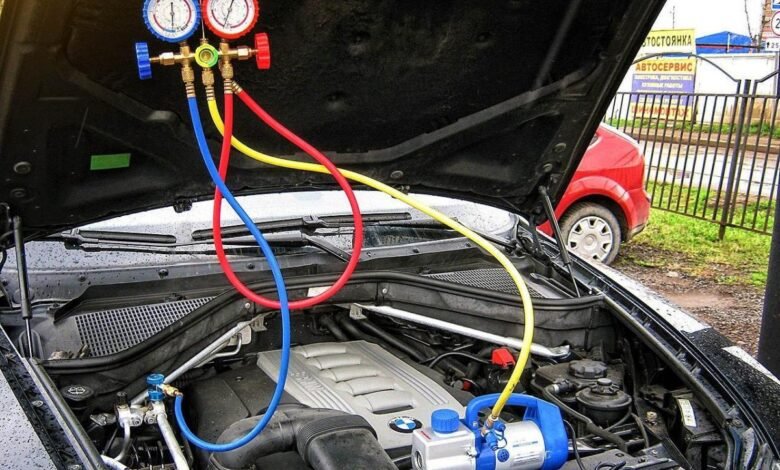How a Faulty Car AC Control Valve Can Affect Your Vehicle’s Cooling System

Your car’s air conditioning (AC) system is crucial for keeping the cabin cool and comfortable, especially during the hot summer months. While many car owners focus on the compressor, condenser, or refrigerant levels, one component that often goes unnoticed is the car AC compressor control valve. This small yet critical part regulates the flow of refrigerant within the system, ensuring that the air conditioning operates efficiently. When the AC control valve malfunctions, it can lead to significant issues, affecting the overall performance of the cooling system. A faulty valve can cause the air conditioning to fail, resulting in a lack of cold air or erratic temperature control.
In this article, we’ll explore the common symptoms of a faulty AC control valve, how to diagnose the issue, and the potential consequences for your car’s AC system. Understanding the importance of this component and its role in the system’s operation is essential for preventing costly repairs and ensuring a comfortable driving experience.
Understanding the Role of the AC Control Valve
Before diving into the symptoms and consequences of a faulty AC control valve, it’s important to understand its role in the car’s AC system. The AC control valve is responsible for regulating the flow of refrigerant into the evaporator, which is the part of the system that cools the air. The refrigerant absorbs heat from the air inside the cabin, and the cool air is then circulated throughout the vehicle.
The control valve helps maintain the correct pressure and temperature of the refrigerant, ensuring that the AC system works efficiently. It adjusts the flow of refrigerant depending on factors such as temperature settings, driving conditions, and engine load. In other words, the control valve is integral to maintaining optimal performance and comfort.
See also: The Backbone of Business: Understanding Financial Management Functions
Symptoms of a Faulty AC Control Valve
When the AC control valve starts malfunctioning, it can trigger a number of noticeable issues. Here are some common symptoms that indicate your car’s AC control valve might be faulty:
1. Weak or Inconsistent Cooling
One of the most common signs of a faulty AC control valve is poor cooling performance. You may notice that your car’s air conditioning doesn’t cool the cabin as effectively as it should. The cooling may be inconsistent, with some areas of the cabin feeling warmer than others. This happens because the valve is no longer regulating the refrigerant flow properly, leading to a decrease in the system’s overall efficiency.
2. Increased Pressure or Temperature in the System
A malfunctioning control valve can cause the refrigerant pressure to fluctuate unpredictably. If the valve is stuck in an open or closed position, it can either cause too much refrigerant to enter the evaporator or restrict the flow entirely. This will increase the pressure within the system, leading to higher temperatures and causing the AC to fail to cool the air as intended.
3. Unusual Noises from the AC System
If you hear strange noises coming from the AC system, such as hissing, gurgling, or clicking sounds, it could be a sign that the control valve is malfunctioning. A stuck or partially blocked valve may cause refrigerant to move erratically, leading to these noises. The abnormal sounds could also indicate a refrigerant leak or an obstruction within the valve itself.
4. Frequent Cycling of the AC Compressor
Another symptom of a faulty AC control valve is the rapid cycling of the compressor. The compressor might switch on and off repeatedly, unable to maintain a steady operation. This happens when the valve is not properly regulating the refrigerant flow, causing the compressor to overheat or underperform. The compressor cycling on and off too frequently can put excessive strain on the entire AC system and reduce its lifespan.
5. AC Blowing Warm Air
In some cases, a faulty control valve can cause the AC to blow warm air instead of cold air. If the refrigerant flow is blocked or insufficient, the evaporator may not receive enough refrigerant to cool the air properly. As a result, the system will blow warm air, leaving you with an uncomfortable driving experience.
Diagnosing the Issue
If you’re experiencing any of the symptoms mentioned above, it’s important to diagnose whether the AC control valve is the root cause of the problem. While some of these symptoms may point to other issues in the system, a faulty control valve is a likely culprit. Here’s how you can diagnose the problem:
- Visual Inspection: Check for any visible signs of damage or leaks around the AC control valve. If the valve is cracked, corroded, or leaking refrigerant, it may need to be replaced.
- Listen for Noises: Pay attention to any unusual sounds coming from the AC system. Hissing, rattling, or gurgling noises may indicate a malfunctioning valve or refrigerant flow issue.
- Test the Refrigerant Pressure: If you have access to an AC pressure gauge, you can measure the pressure of the refrigerant in the system. Low or fluctuating pressure readings could indicate a faulty control valve.
- Professional Diagnosis: If you’re unsure about diagnosing the issue yourself, it’s best to take your car to a professional mechanic who can run diagnostic tests on the AC system. They can identify whether the control valve is at fault or if another component is causing the problem.
Consequences of a Faulty AC Control Valve
If left unchecked, a faulty AC control valve can lead to several problems that can affect the overall performance and longevity of your car’s air conditioning system:
- Reduced Efficiency: A malfunctioning control valve will cause the AC system to operate inefficiently, consuming more energy and fuel to produce less cooling. This can result in higher fuel consumption and increased wear on the compressor and other components.
- Potential Damage to the Compressor: If the AC control valve is not regulating refrigerant flow properly, it can lead to compressor failure. The compressor relies on consistent refrigerant pressure to function effectively. Without proper regulation, the compressor can overheat or seize, resulting in costly repairs.
- Increased Repair Costs: Ignoring the issue with the AC control valve may lead to more severe damage to other components in the cooling system. This could result in higher repair costs and potentially a complete system replacement if not addressed in a timely manner.
Conclusion
The AC control valve is a small but essential component in your car’s air conditioning system. A faulty control valve can lead to a variety of issues, including poor cooling performance, increased system pressure, and compressor damage. If you notice any of the symptoms mentioned, it’s important to address the problem as soon as possible to avoid further damage and costly repairs. Regular maintenance, including inspecting the AC control valve, can help keep your vehicle’s cooling system functioning at its best, ensuring a comfortable driving experience even on the hottest days.







